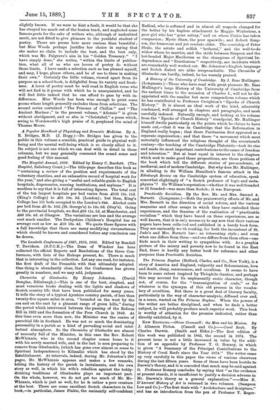A Third Poetry - Book. Compiled by M. A. Woods. (lilac- millan.)—The
"Second School Poetry-Book," edited by Miss Woods, opened with a poem of Blake, and ended with " Pictures from the Faery Queene." The third volume- of her poetical series begins with Keats, and ends also with similar " Pictures " from Spenser. The compiler has, we think, done well in selections of this kind to disregard chronological order ; but the dates of the poets' birth and death days, if given in an index, would have increased the value of a book primarily intended for high-school girls. We venture to say that not one girl in a hundred knows what century gave birth to such comparatively obscure poets as Watson, Heywood, Habington, Daniel, and Lodge, and it would surprise us if they were acquainted with the period in which many poets flourished who may be more familiar to them by name. Miss Woods takes the widest range in her anthology, and gathers some of her flowers in fields but
slightly known. If we were to hint a fault, it would be that she has strayed too much out of the beaten track, and neglected some famous poets for the sake of writers who, although of undoubted merit, are not fitted to give pleasure to the youthful student of poetry. There are poems here more curious than beautiful ; but Miss Woods perhaps justifies her choice in saying that she makes no claim to include the best, and the best only, which was Mr. Palgrave's aim in his "Golden Treasury." "I have simply done," she writes, "within the limits of publica- tion, what all of us who are lovers of poetry do without those limits. I have made a selection such as has pleased myself, and may, I hope, please others, and be of use to them in making their own." Certainly the little volume, viewed apart from its purpose as a school-book, is delightful from its variety and fresh- ness. A lover of poetry must be well read in English verse who will not find in it poems with which he is unacquainted, and he will find little indeed that he can afford to pass by with in- difference. Miss Woods has been wise enough to print some poems whose length generally excludes them from selections. The second series contained "The Prisoner of Chillon " and "The Ancient Mariner ;" in the present volume, " Adonais " is given without abridgment, and so also is "ChristabeL" a poem which, *wing to Wordsworth's high praise of it, perplexed the mind of Thomas Moore.



































 Previous page
Previous page